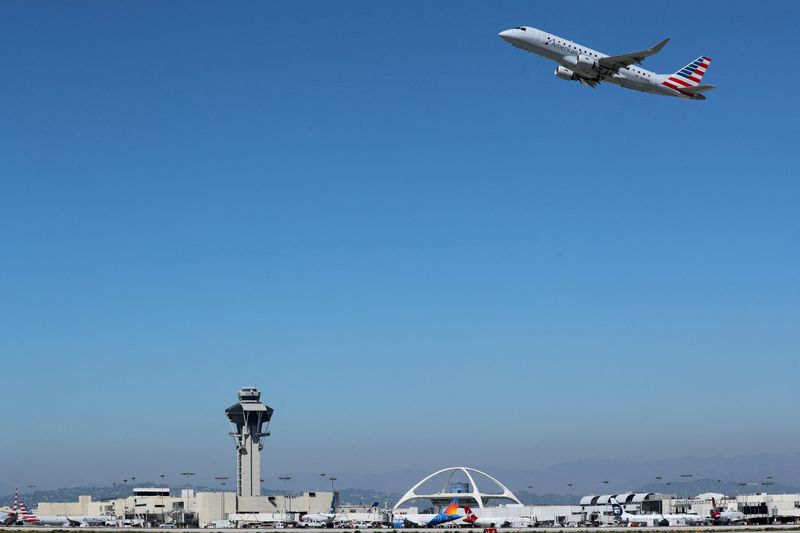By Rajesh Kumar Singh and Joanna Plucinska
CHICAGO/LONDON (Reuters) – Record demand for summer travel was expected to translate into huge revenues for airlines, but quarterly reports don’t exactly look great.
As many customers flock to travel destinations around the world, airlines are finding that an oversupply of seats in the price-sensitive part of the market has forced them to cut fares to fill their planes.
This week, American and Southwest Airlines (NYSE:) earnings are expected to bring more bad news, following gloomy quarterly outlooks from United, Delta, Alaska Airlines and Ryanair.
Airline executives attributed the overcapacity to an overly optimistic view of travel demand, which was robust by most measures.
Passenger traffic in the US is reaching record levels this year. In its first six months, the U.S. Transportation Security Administration (TSA) screened an average of about 2.46 million airline passengers per day, a 6% increase over last year.
“It was just that airlines were hoping demand would be even stronger,” Alaska CFO Shane Tackett said in an interview.
In addition to discounting pressures, new labor contracts and higher leasing rates and maintenance costs have driven up the sector’s operating costs.
In May, American lowered its second-quarter earnings forecast, citing weaker pricing power in the domestic market. Although the Texas-based airline has promised a reboot, analysts say reversing course will be time-consuming and costly.
“The U.S. network leaves it more exposed to the currently most supply-heavy markets and less able to offset the higher cost environment,” said TD Cowen analyst Thomas Fitzgerald.
Southwest has been hit hard by plane delivery delays from Boeing (NYSE:) and is under pressure from an activist investor to oust its CEO, overhaul its board and shake up its operations.
The price fighter has lowered its revenue forecast for the second quarter. Fitzgerald said Southwest has little ability to materially increase revenue performance, increasing risk to its balance sheet.
Both American and Southwest will report earnings on Thursday.
THE POSSIBLE STRUGGLE OF EUROPE
The first quarter for European airlines was tougher than expected, and Ryanair’s second-quarter results on Monday offered little solace for investors.
Ryanair’s profits fell by almost half this quarter after ticket prices fell 15% as customers refused to pay higher prices.
Analysts warn that these price concerns could spread across the sector in Europe. “More aggressive pricing by the market leader is likely to result in negative consequences for the other European airlines,” Liberum analyst Gerald Khoo said in a note.
Deutsche Lufthansa (ETR:) cut its 2024 profit forecast for a second time and issued a second-quarter profit warning last week due to weaker yields.
Earnings from British budget carrier easyJet (LON:) on Wednesday and Air France-KLM on Thursday will shed light on cost and revenue pressures, with some fearing Air France-KLM may not be able to recover from a weaker first quarter.
European airline shares fell across the board on Monday, with Ryanair the hardest hit, down 14%.
Wizz Air CEO Jozsef Varadi said the budget carrier still expects long-term returns to rise, although it faces restrictions related to RTX engine controls that will force some of its fleet to be grounded.
“I think we are doing better than this,” Varadi told Reuters, referring to Ryanair’s challenges over softer prices.
US airlines are now moderating their capacity. Annual domestic seat growth is expected to slow to 3% in the September quarter, compared to 6% a quarter ago. Some carriers hope this will increase their pricing power, but that may not be enough to boost profits.

United currently expects full-year earnings to fall to the low end of the forecast range of $9 to $11 per share. The company relies on competitors to further reduce unprofitable flying and thus increase profits.
“While we are seeing this incredible change unfolding in the industry, the precise timing and magnitude are difficult to determine,” United President Brett Hart told investors on Thursday.


